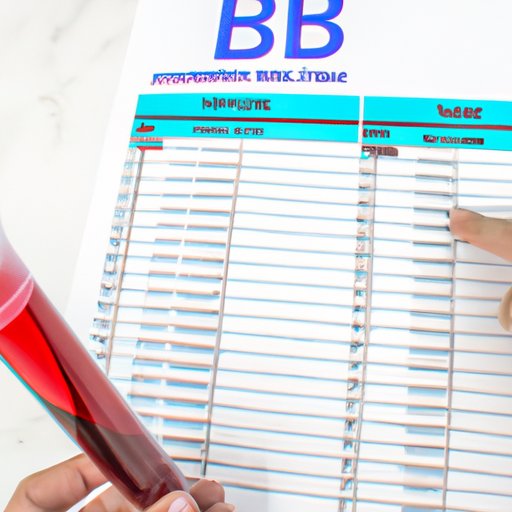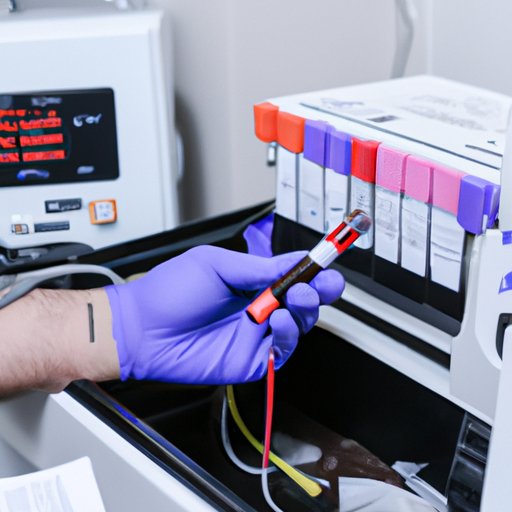Introduction
Blood work is an important part of diagnosing and treating medical conditions. Whether it’s to track a patient’s progress or to diagnose a potential issue, understanding the results can be critical for effective treatment. But how long does it take for blood work to come back?
Blood work is a broad term used to describe any type of laboratory test that involves collecting a sample of a person’s blood. This sample is then analyzed in a lab to detect various substances, such as hormones, proteins, antibodies, and cell counts. The results of these tests help doctors make more informed decisions regarding a patient’s health.
The amount of time it takes for blood work results to come back can vary significantly depending on several factors. In this article, we’ll explore what affects the turnaround time for blood work and provide tips for getting results back faster.

Examining the Different Factors That Affect the Turnaround Time for Blood Work Results
The length of time it takes for blood work results to come back depends on several factors, including the type of test being conducted, the number of tests being run, the availability of lab personnel and equipment, and the location of the testing facility.
Type of Test
The type of test being performed can have a major impact on how long it takes for results to come back. Some tests, such as those for cholesterol levels, may only take a few minutes to complete. Other tests, such as those for HIV or hepatitis, can take several hours or even days for results to be available.
Number of Tests Being Conducted
The number of tests being run can also affect the turnaround time for blood work results. If a single test is being conducted, the results may come back relatively quickly. But if multiple tests are being run, it may take longer for all results to be ready.
Availability of Lab Personnel and Equipment
The availability of lab personnel and equipment can also play a role in how long it takes for blood work results to come back. If the lab is short-staffed or has limited resources, it can take longer for results to be processed.
Location of the Testing Facility
The location of the testing facility can also have an effect on turnaround time. Generally speaking, blood work results will take longer to come back if the testing facility is located further away from the patient’s home. For example, it may take longer for results to come back from a lab in another state than from one in the same city.

Exploring What to Expect When Waiting for Blood Work Results
Once the blood sample has been collected, there are a few things to expect when waiting for the results to come back. It’s important to understand the process of how results are communicated and where to find information on estimated wait times.
How Results are Communicated
In most cases, blood work results are communicated directly to the patient’s doctor, who then shares them with the patient. Depending on the doctor’s practice, they may communicate the results verbally during an appointment or via telephone call or email. Some doctors may also choose to provide results through a secure online portal.
Sources of Information on Estimated Wait Times
Patients who are curious about the estimated wait time for their blood work results can often find information on the lab’s website or by calling the lab directly. The lab technician who collects the sample should also be able to provide an estimate of when the results should be available.
A Guide to Understanding the Typical Length of Time for Blood Work Results
It’s helpful to understand the typical turnaround time for different types of blood work so you can better plan for when you can expect results. Here are some of the most common tests and their average turnaround times.
Common Tests and Their Average Turnaround Times
- Complete Blood Count (CBC): 1-2 days
- Comprehensive Metabolic Panel (CMP): 1-2 days
- Lipid Panel: 1-2 days
- Thyroid Stimulating Hormone (TSH): 1-2 days
- HIV Test: 2-4 days
- Hepatitis Test: 5-7 days
Reasons Why Results May Take Longer
In certain cases, it may take longer than the average turnaround time for results to come back. According to Dr. Patricia Koffler, an emergency medicine physician at Northwestern Medicine, “If the lab is busy, if the specimen needs to be sent to an outside lab, or if it’s a complex test, the turnaround time could be longer.”1
Tips for Speeding Up the Process of Getting Back Blood Work Results
There are a few steps you can take to ensure that you get your blood work results back as quickly as possible.
Scheduling Appointments in Advance
One of the best ways to speed up the process of getting back blood work results is to schedule appointments in advance. Most labs require appointments for blood draws, so scheduling ahead of time can help reduce wait times.
Researching Testing Facilities
Doing research on the testing facilities in your area can also be helpful. Look for reviews from other patients and ask friends and family for recommendations. This can help you find a lab that is efficient and reliable.
Working With Your Doctor
Finally, working with your doctor can help you get your blood work results back faster. Ask your doctor which labs they recommend and if they offer expedited services. They may also be able to provide guidance on how to prepare for the blood draw and what to expect afterwards.

How to Read and Interpret Your Blood Work Results
Once you receive your blood work results, it’s important to know how to read and interpret them. While your doctor will explain the results to you, understanding the basics can help you better understand what’s going on with your health.
Understanding Your Report
Your report will typically include several sections, including a summary of the test results and a list of reference ranges. The summary will provide an overview of the test results, while the reference ranges will give you an idea of what is considered normal for each result.
Knowing When to Seek Medical Advice
If your results show anything out of the ordinary, it’s important to seek medical advice. Your doctor will be able to provide more information on the meaning of the results and advise you on the best course of action.
Investigating Potential Causes of Delayed Blood Work Results
Delays in receiving blood work results can be frustrating, but it’s important to understand why they might occur. Here are some of the potential causes of delayed results.
Errors in Sample Collection or Labeling
Errors in sample collection or labeling can cause delays in getting back results. Poorly labeled samples or samples that are taken incorrectly can lead to inaccurate results or a delay in processing.
Poor Quality Samples
Samples that are of poor quality can also cause delays in receiving results. If the sample is not properly collected or stored, it may not yield accurate results.
Overuse of the Lab
Finally, overuse of the lab can cause delays in getting back results. Labs are often overwhelmed with requests, and this can lead to delays in processing samples.
Conclusion
Blood work is an important part of diagnosing and treating medical conditions. But how long does it take for blood work to come back? The answer depends on several factors, including the type of test being conducted, the number of tests being run, the availability of lab personnel and equipment, and the location of the testing facility. It’s helpful to understand the typical turnaround times for different tests and to take steps to speed up the process of getting results back. Finally, it’s important to know how to read and interpret your results and when to seek medical advice.
1 https://www.northwesternmedicine.
(Note: Is this article not meeting your expectations? Do you have knowledge or insights to share? Unlock new opportunities and expand your reach by joining our authors team. Click Registration to join us and share your expertise with our readers.)
